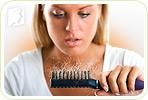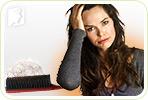Women who suffer from thinning hair or varying degrees of hair loss are not alone. Hair loss during menopause is common, and a wide variety of products are available to help treat women's hair loss. Keep reading to learn more about conventional and alternative products.
Conventional Hair Loss Products
Some women may find that conventional treatments for hair loss are the right option for them.
Hormone replacement therapy (HRT)

For women in menopause, HRT is a commonly prescribed regimen to combat all symptoms of menopause, including hair loss. This treatment works by replacing hormones that women have lost during menopause - most notably estrogen, an essential hormone for hair growth. However, it may not work for all women, and it is not effective for non-hormonal causes of hair loss.
Shampoos and topical products
These hair loss products are often championed as wonder-drugs through aggressive marketing campaigns, but for many women, they are hardly more effective than placebos. Every scalp is different, yet there are dozens of topical hair growth products that promise to work for everyone. Though they may make a difference for some women, not all will see results from these products.
Alternative Methods and Products
A number of alternative methods and products for women's hair loss are also available. Read on to learn more about these.
Lifestyle changes

Many women find that incorporating a few lifestyle changes - such as ensuring balanced nutrition, exercising regularly, and reducing stress - can have a positive effect on thinning or disappearing hair. Eating foods rich in iron, protein, and B vitamins are a great alternative way for women to reduce and possibly halt hair loss.
Herbal supplements
A number of natural herbal products are marketed to treat menopausal hair loss, with phytoestrogenic and hormone-regulating herbal supplements at the top of the list.
Phytoestrogenic supplements (e.g., ginseng, black cohosh) work by introducing estrogen into a woman's body in a similar way to HRT. These herbs can also ultimately cause a decrease in natural estrogen levels because the body becomes somewhat dependent on them. In addition, it is thought that menopausal hair loss is not due just to low estrogen, but also unbalanced androgen levels.

Hormone-regulating herbal supplements, however, don't introduce foreign estrogen into a woman's body, but rather help stave off hair loss by encouraging the body to produce more of its own estrogen. Natural supplements, like Macafem, are a safe alternative for women who want to avoid synthetic medications and future hair loss.
More Information
Women who want more information on what they can do about hair loss and other symptoms of menopause should consult their doctor. A physician can offer knowledgeable, helpful advice on different treatments and products for hair loss.
Sources
- Dinh, Q.Q. & Sinclair, R. (2007). Female pattern hair loss: Current treatment concepts. Clinical Interventions in Aging, 2(2), 189-199. Retrieved from http://www.ncbi.nlm.nih.gov/pmc/articles/PMC2684510/
- National Institutes of Health. (2013). Hair loss. Retrieved January 8, 2016, from https://www.nlm.nih.gov/medlineplus/ency/article/003246.htm



